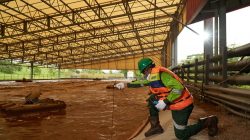A Legacy of Climate Resilience and Social Transformation
After six years of dedicated work, the Resilience Against Climate Change – Social Transformation Research and Policy Advocacy (REACH-STR) project has officially concluded. Throughout its tenure, the initiative focused on fostering inclusive, evidence-based climate action to support Ghana’s development goals. The closing ceremony, held in Accra, brought together a diverse group of stakeholders from government, academia, and international partners who celebrated the project’s achievements in enhancing climate resilience, driving policy innovation, and strengthening institutional capacity—especially in the Upper West and Savannah regions.
Funded by the European Union (EU) under the EU-Ghana Agriculture Programme (EU-GAP), REACH-STR was led by the International Water Management Institute (IWMI) in collaboration with several key institutions, including the Centre for Migration Studies at the University of Ghana, Simon Diedong Dombo University for Business and Integrated Development Studies (SDD-UBIDS), and the Council for Scientific and Industrial Research-Science and Technology Policy Research Institute (CSIR-STEPRI). These partnerships were instrumental in shaping the project’s impactful outcomes.
During the event, Mr. Massimo Mina, Head of Cooperation at the EU Delegation to Ghana, delivered a keynote address highlighting the significance of REACH-STR as a model for integrated climate action. He emphasized how the project connected research, policy, and community resilience, showcasing the EU’s commitment to supporting sustainable food systems and inclusive development in Ghana. With an investment portfolio of €183 million in the agriculture sector, the EU has been actively working to address the severe climate impacts in northern regions.
Mr. Mina praised the project’s success in creating practical tools such as the gender and climate vulnerability hotspot map and in building capacity across various sectors. He also stressed the importance of maintaining partnerships to sustain and scale these outcomes, reaffirming the EU’s ongoing support for climate-resilient agriculture and inclusive development in Ghana.
Representing the Ministry of Food and Agriculture (MoFA), Paulina Addy, Director of the Women in Agricultural Development Directorate, commended the REACH-STR initiative for its role in strengthening decision-making in agriculture and local governance. She highlighted how the project generated actionable knowledge, promoted gender-responsive programming, and empowered planners through tools that are already influencing development plans. MoFA pledged to integrate the knowledge products and planning frameworks into ongoing programs, ensuring continued impact.
Charity Osei-Amponsah, IWMI Deputy Country Representative and Project Lead, reflected on the journey of REACH-STR, stating that the project demonstrated the possibility of inclusive, evidence-led action when institutions collaborate. She noted key achievements such as the awarding of 19 scholarships to Master’s and PhD students, the training of over 50 district development officers, and the adoption of a six-step social transformation framework. These efforts have had a real impact on both institutions and communities.
Dr. William Quarmine, the project’s Technical Lead, provided a detailed overview of how REACH-STR developed tools to guide intervention design, strengthen capacity, and influence policy. He emphasized the project’s contributions to understanding social transformation in a climate context, including how it happens, how to support it, and how to measure its effects. The project produced five major studies, six peer-reviewed articles, and over 50 policy recommendations. Tools like the participatory mapping guide and online hotspot maps now provide concrete support to planners and advocates.
Dr. Quarmine also highlighted the project’s outreach, which included capacity-building for over 70 development planners across the five northern regions, 30 gender officers, and community-level engagements reaching more than 380 individuals. The event served as a platform to reiterate calls for continued knowledge-sharing, integration of tools into national systems, and deeper collaboration among government, development partners, academia, and civil society.
The legacy of REACH-STR will continue to shape climate resilience and social transformation in Ghana, offering valuable insights and tools for future initiatives.





